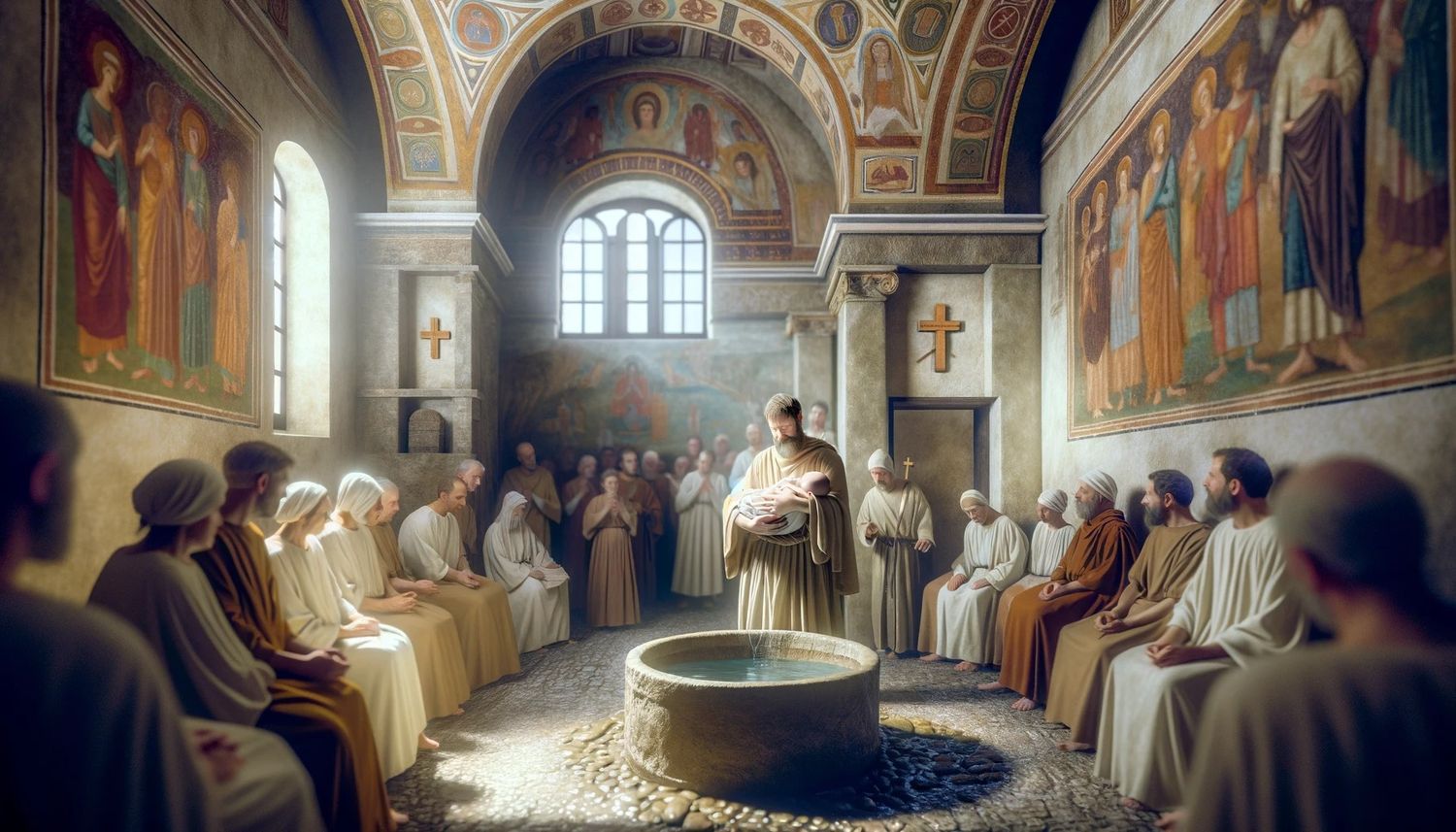Home>Theology and Spirituality>Why Does The Catholic Church Practice Infant Baptism?


Theology and Spirituality
Why Does The Catholic Church Practice Infant Baptism?
Published: March 1, 2024
Ericka Andersen, an editor at Christian.net, expertly merges digital strategy with content creation, focusing on faith and societal issues. Her communication skills enhance the platform's engaging narratives, fostering meaningful dialogue on belief's impact on society.
Discover the theological significance behind the Catholic Church's practice of infant baptism and its role in spirituality. Explore the beliefs and traditions that shape this sacramental rite.
(Many of the links in this article redirect to a specific reviewed product. Your purchase of these products through affiliate links helps to generate commission for Christian.net, at no extra cost. Learn more)
Table of Contents
The Origins of Infant Baptism in the Catholic Church
-
Early Christian Practices: The practice of infant baptism has its roots in the early traditions of the Catholic Church. In the early centuries of Christianity, it was customary for entire households, including children, to be baptized. This practice is reflected in the New Testament, where there are references to entire households being baptized, without specific mention of excluding children.
-
Desire for Salvation: The early Christians believed in the importance of baptism for the salvation of individuals. This belief led to the inclusion of infants in the practice of baptism, as it was seen as a means of cleansing them from original sin and initiating them into the Christian faith.
-
Symbolism of Purification: The act of baptism was seen as a symbolic cleansing from sin and a rebirth into the Christian community. Infants, although not capable of understanding the significance of the ritual, were included in this practice as a way of ensuring their spiritual well-being from an early age.
-
Historical Context: In the historical context of the early Church, infant mortality rates were high, and there was a sense of urgency to ensure that infants were baptized to secure their place in the afterlife. This urgency contributed to the development of the practice of infant baptism within the Catholic Church.
-
Continuation of Jewish Traditions: The practice of infant baptism can also be seen as a continuation of the Jewish tradition of circumcision, where male infants were initiated into the covenant community at an early age. In a similar vein, infant baptism serves as a way of initiating children into the community of believers from the earliest stages of their lives.
-
Development of Doctrine: Over time, the theological understanding of infant baptism evolved within the Catholic Church, leading to its formalization as a sacrament. The early Church Fathers, such as Origen and Augustine, contributed to the theological justification for infant baptism, further solidifying its place within the tradition of the Catholic Church.
The origins of infant baptism in the Catholic Church are multifaceted, stemming from early Christian practices, theological beliefs, historical context, and the development of doctrine within the Church. These factors have contributed to the establishment and continuation of the practice of infant baptism as an integral part of the Catholic faith.
Read more: What Is Catholic Infant Baptism
The Theological Justification for Infant Baptism
-
Inheritance of Original Sin: According to Catholic theology, all human beings inherit original sin from the fall of Adam and Eve. Infant baptism is seen as a means of cleansing the infant from this inherited sin, thereby initiating them into the life of grace within the Church.
-
Rebirth and Regeneration: The sacrament of baptism is understood as a means of spiritual rebirth and regeneration. Through baptism, individuals are believed to be born anew in Christ and receive the gift of the Holy Spirit. This theological understanding extends to infants, who are seen as capable of receiving these spiritual blessings through the sacrament of baptism.
-
Incorporation into the Body of Christ: Baptism is viewed as the sacramental rite through which individuals are incorporated into the mystical body of Christ, which is the Church. This incorporation is not limited by age, as the grace of baptism is believed to be efficacious for infants as well as adults, uniting them with the community of believers.
-
Entrance into the Covenant Community: In the Catholic tradition, baptism is considered the gateway to participation in the life of the Church and the Christian community. Infants, through baptism, are welcomed into this covenant community and are embraced as members of the Church, despite their inability to comprehend the theological significance of the sacrament.
-
Preparation for the Sacraments of Initiation: Infant baptism is also seen as the first step in the process of receiving the other sacraments of initiation, namely confirmation and Eucharist. Through baptism, infants are prepared for the reception of these sacraments as they grow and mature in their faith within the Catholic Church.
-
Parental Responsibility and Faith Formation: The theological justification for infant baptism also emphasizes the role of parents and godparents in nurturing the faith of the baptized child. It is believed that through the support and guidance of the faith community, infants who are baptized will be raised in the Catholic faith and grow to embrace their baptismal promises as they mature.
The theological justification for infant baptism within the Catholic Church is grounded in the beliefs regarding original sin, rebirth, incorporation into the body of Christ, entrance into the covenant community, preparation for future sacraments, and the responsibility of parents and godparents in nurturing the faith of the baptized child. These theological considerations underpin the practice of infant baptism as a fundamental aspect of Catholic sacramental theology.
The Role of Original Sin in Infant Baptism
-
Inherited Sin: According to Catholic doctrine, original sin is the state of sin in which all human beings are born due to the disobedience of Adam and Eve in the Garden of Eden. This inherited sin is seen as a fundamental aspect of human nature, and it is believed to separate individuals from God's grace. Infant baptism is regarded as the means by which this original sin is cleansed from the infant, restoring them to a state of grace and initiating them into the life of the Church.
-
Spiritual Restoration: The act of baptism is understood as a spiritual rebirth, through which the baptized individual is cleansed from sin and restored to a state of grace. In the case of infants, baptism is seen as the means by which they are spiritually restored and brought into communion with God, despite their inability to comprehend or consciously repent for original sin.
-
Necessity for Salvation: Within the Catholic tradition, baptism is considered necessary for salvation. This belief is rooted in the understanding that baptism cleanses individuals from sin and incorporates them into the body of Christ, thereby opening the door to eternal life. In the case of infants, the urgency of ensuring their salvation and spiritual well-being is a driving factor behind the practice of infant baptism.
-
Initiation into the Christian Faith: Infant baptism is also viewed as the sacramental rite through which infants are initiated into the Christian faith and the life of the Church. By receiving the sacrament of baptism, infants are welcomed into the community of believers and are embraced as members of the Church, despite their lack of cognitive understanding of the theological implications of the ritual.
-
Parental Concern: The role of original sin in infant baptism also reflects the concern of parents and the faith community for the spiritual welfare of infants. It is believed that through baptism, infants are freed from the burden of original sin and are given the opportunity to grow in the grace of God within the context of the Christian community.
-
Preparation for Future Sacraments: The cleansing of original sin through infant baptism is seen as the first step in the process of preparing the baptized child for the reception of the other sacraments of initiation, namely confirmation and Eucharist. By initiating infants into the life of grace through baptism, the Church lays the foundation for their continued spiritual growth and participation in the sacramental life of the Church.
The role of original sin in infant baptism is a central aspect of Catholic sacramental theology, reflecting the belief in the necessity of baptism for the cleansing of sin, initiation into the Christian faith, and preparation for a life of grace within the Church.
The Practice of Infant Baptism in Catholic Tradition
-
Sacramental Rite: Infant baptism is a significant sacramental rite within the Catholic tradition, marking the entry of infants into the life of the Church. It is a solemn and joyous occasion for families and the faith community, as it symbolizes the child's incorporation into the body of Christ and their reception of God's grace.
-
Community Celebration: The practice of infant baptism is often celebrated within the context of the faith community, with family members, godparents, and fellow believers coming together to witness and participate in the sacramental ritual. This communal aspect emphasizes the role of the Church as a spiritual family that welcomes and embraces the newly baptized infant.
-
Liturgical Elements: The baptismal ceremony typically includes liturgical elements such as the blessing of water, the anointing with chrism, the profession of faith by the parents and godparents, and the baptismal vows. These elements serve to underscore the sacred nature of the sacrament and its significance within the Catholic tradition.
-
Symbolism and Meaning: The practice of infant baptism carries rich symbolism and meaning within Catholic theology. The water used in baptism symbolizes purification and new life in Christ, while the anointing with chrism signifies the sealing of the baptized infant with the gift of the Holy Spirit. These symbols convey the spiritual transformation and grace that the infant receives through the sacrament.
-
Parental Commitment: The practice of infant baptism also highlights the commitment of parents to raise their child in the Catholic faith. Through the baptismal vows and promises made by the parents and godparents, there is an acknowledgment of the responsibility to nurture the faith of the baptized child and to provide a supportive environment for their spiritual growth.
-
Continuation of Tradition: Infant baptism represents the continuation of a longstanding tradition within the Catholic Church, reflecting the belief in the importance of initiating infants into the Christian faith from an early age. This practice serves as a visible sign of the Church's commitment to nurturing the faith of its youngest members and integrating them into the life of the faith community.
-
Preparation for Future Participation: The practice of infant baptism also serves as the initial step in preparing the baptized child for future participation in the sacramental life of the Church. It lays the foundation for the child's eventual reception of the sacraments of confirmation and Eucharist, as they grow and mature in their understanding of the Catholic faith.
The practice of infant baptism in the Catholic tradition encompasses a rich tapestry of communal celebration, liturgical elements, symbolism, parental commitment, tradition, and preparation for future participation in the life of the Church. It stands as a cherished and integral aspect of Catholic sacramental practice, reflecting the Church's embrace of its youngest members and their spiritual journey within the faith community.
The Significance of Godparents in Infant Baptism
-
Spiritual Guidance: Godparents play a crucial role in providing spiritual guidance and support to the baptized child. They are entrusted with the responsibility of nurturing the child's faith and serving as role models in the Christian life. Through their words and actions, godparents are called to exemplify the values and teachings of the Catholic faith, guiding the baptized child in their spiritual journey.
-
Witness to the Faith: By standing as sponsors for the baptized child, godparents publicly affirm their own commitment to the Catholic faith. Their presence at the baptismal ceremony signifies their willingness to uphold the teachings of the Church and to actively participate in the child's religious upbringing. Godparents serve as witnesses to the faith, both for the child and the entire faith community.
-
Support and Encouragement: Godparents offer ongoing support and encouragement to the baptized child as they grow in their faith. They are called to pray for the child, provide moral guidance, and offer a supportive presence in the child's life. Through their involvement, godparents contribute to the child's spiritual formation and help instill a deep sense of belonging within the Church.
-
Educators in the Faith: In their role as godparents, individuals are called to impart the teachings of the Catholic faith to the baptized child. This educational aspect involves sharing the stories of the Bible, explaining the significance of sacraments, and fostering an understanding of Catholic beliefs and traditions. Godparents serve as educators in the faith, helping the child develop a strong foundation in Catholic doctrine.
-
Lifelong Relationship: The bond between a godparent and their godchild is intended to be a lifelong relationship. Beyond the baptismal ceremony, godparents are encouraged to maintain a supportive and nurturing presence in the child's life, offering guidance and wisdom as the child matures in their faith. This enduring relationship reflects the enduring commitment of godparents to the spiritual well-being of the baptized child.
-
Role in Sacramental Life: Godparents also play a role in the child's future sacramental life within the Church. They may be called upon to support the child in their preparation for the sacraments of confirmation and Eucharist, offering guidance and encouragement as the child takes further steps in their journey of faith. The godparent's involvement extends beyond baptism, encompassing the child's ongoing sacramental experiences.
-
Connection to the Faith Community: Through their role as godparents, individuals become integral members of the wider faith community. They are called to actively engage with the Church, participate in the spiritual growth of the baptized child, and contribute to the communal life of the parish. Godparents serve as a bridge between the child and the larger Christian community, fostering a sense of belonging and connection.
The significance of godparents in infant baptism is deeply rooted in their role as spiritual guides, witnesses to the faith, sources of support and encouragement, educators in the faith, providers of lifelong relationship, contributors to the child's sacramental life, and connectors to the wider faith community. This role is a cherished and meaningful aspect of the sacrament of baptism within the Catholic Church.
Read more: Why Infant Baptism Is Wrong
The Debate and Controversy Surrounding Infant Baptism
-
Age of Understanding: One of the primary points of debate surrounding infant baptism is the age at which individuals are capable of understanding and consenting to the sacrament. Critics argue that infants lack the cognitive development to comprehend the significance of baptism and make a conscious decision to embrace the Christian faith. This raises questions about the validity of baptizing individuals who are unable to actively participate in the ritual.
-
Biblical Precedence: Another area of contention revolves around the interpretation of biblical passages related to baptism. Some scholars and theologians question the scriptural basis for infant baptism, pointing to the absence of explicit references to the baptism of infants in the New Testament. This debate centers on differing interpretations of biblical teachings and the application of these teachings to the practice of infant baptism.
-
Freedom of Choice: Critics of infant baptism raise concerns about the freedom of individuals to choose their religious beliefs. They argue that baptizing infants infringes upon their autonomy and denies them the opportunity to make a personal decision about their faith. This debate intersects with broader discussions about religious freedom and the rights of individuals to determine their own spiritual path.
-
Historical Development: The historical development of infant baptism within the early Church is a subject of controversy among scholars and theologians. Some argue that the practice evolved over time and was influenced by cultural and societal factors, rather than being rooted in the original teachings of Jesus and the apostles. This historical perspective raises questions about the authenticity and theological justification of infant baptism.
-
Alternative Rites of Initiation: The debate surrounding infant baptism also encompasses discussions about alternative rites of initiation within the Christian tradition. Some denominations and Christian communities practice believer's baptism, which involves baptizing individuals upon their profession of faith. This raises questions about the diversity of baptismal practices and the theological implications of different approaches to initiation into the Christian faith.
-
Theological Significance: The theological significance of infant baptism is a point of contention, particularly regarding the understanding of original sin and the spiritual rebirth conferred through the sacrament. Critics question the theological rationale for baptizing infants and challenge the doctrinal basis for the practice within the framework of Catholic sacramental theology.
-
Parental Authority: The role of parents in deciding on behalf of their infants' participation in baptism is a subject of debate. Critics argue that parental authority should not extend to making religious commitments on behalf of their children, especially when the children are not able to express their own beliefs. This debate touches on issues of parental rights and the religious upbringing of children.
The debate and controversy surrounding infant baptism encompass a range of theological, biblical, ethical, and historical considerations. These discussions reflect the diversity of perspectives within the Christian community and the ongoing dialogue about the practice of infant baptism within the Catholic Church and beyond.














